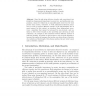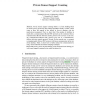24 search results - page 2 / 5 » Committed Oblivious Transfer and Private Multi-Party Computa... |
DAGSTUHL
2006
13 years 6 months ago
2006
It is well known that unconditionally secure bit commitment is impossible even in the quantum world. In this paper a weak variant of quantum bit commitment, introduced independent...
CRYPTO
2005
Springer
13 years 10 months ago
2005
Springer
Since bit and string oblivious transfer and commitment, two primitives of paramount importance in secure two- and multi-party computation, cannot be realized in an unconditionally ...
ICICS
2005
Springer
13 years 10 months ago
2005
Springer
Private itemset support counting (PISC) is a basic building block of various privacy-preserving data mining algorithms. Briefly, in PISC, Client wants to know the support of her i...
WISEC
2010
ACM
13 years 10 months ago
2010
ACM
Currently, companies are about to optimize their internal processes by monitoring items they handle with Radio Frequency Identification (RFID). However, there is a risk that sens...
CRYPTO
1990
Springer
13 years 8 months ago
1990
Springer
This paper describes a method for n players, a majority of which may be faulty, to compute correctly, privately, and fairly any computable function f(Xl, ...,x,) where xi is the i...


